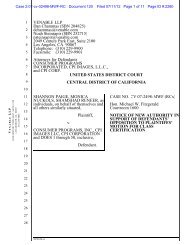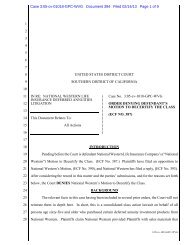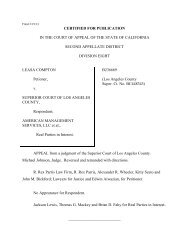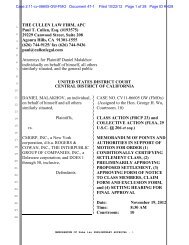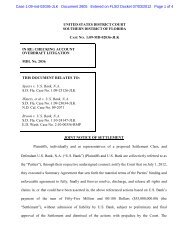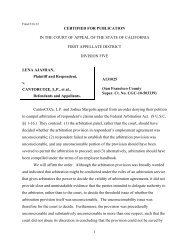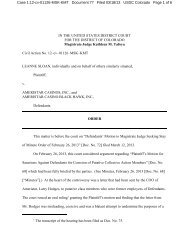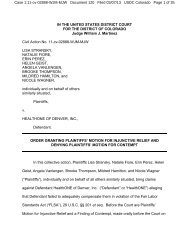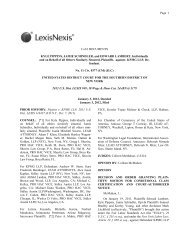here - FindLaw
here - FindLaw
here - FindLaw
You also want an ePaper? Increase the reach of your titles
YUMPU automatically turns print PDFs into web optimized ePapers that Google loves.
section 22, states in part: ―If any court determines that this Agreement in its entirety<br />
shall not be enforced, such determination shall be effective only as to Covered<br />
Employees who reside in the state w<strong>here</strong> such court is located, and not as to any other<br />
Covered Employees . . . .‖ (Italics added.) Yet, according to Neiman Marcus, the<br />
Agreement‘s delegation provision means that an arbitrator always determines any<br />
question concerning enforceability. The severability provision, however, recognizes that<br />
a court may decide the same issue.<br />
We are not writing on a clean slate in the face of such a contradiction. In one case,<br />
the trial court ruled: ―‗[W]hether a particular arbitration agreement is unconscionable is a<br />
―gateway‖ issue that a court decides, rather than an arbitrator, unless the arbitration<br />
agreement at issue clearly reserves that decision for the arbitrator. The arbitration<br />
agreement <strong>here</strong> does not clearly provide that issues of enforceability are to be decided by<br />
the arbitrator. Instead, the agreement is inconsistent on that issue. On the one hand, it<br />
provides in relevant part that ―interpretation or the enforceability of this arbitration<br />
agreement, including without limitation, its . . . voidability for any cause . . . shall be<br />
decided by the arbitrator.‖ However, that same section of the agreement contains a<br />
severability provision in the event that ―any provision of this arbitration agreement shall<br />
be determined by the arbitrator or by any court to be unenforceable. . . .‖ Thus, it<br />
acknowledges the possibility that enforceability issues will be decided, not by the<br />
arbitrator, but rather by the court. In the absence of a clear, consistent, and unambiguous<br />
reservation of that issue to the arbitration, it is properly decided by the court.‘‖ (Baker v.<br />
Osborne Development Corp. (2008) 159 Cal.App.4th 884, 891 (Baker).)<br />
The Court of Appeal affirmed, stating: ―[T]he trial court found the arbitration<br />
agreement was ambiguous on the issue of whether arbitrability was to be determined by<br />
the arbitrator. In our independent judgment . . . , we agree with the trial court that<br />
although one provision of the arbitration agreement stated that issues of enforceability or<br />
voidability were to be decided by the arbitrator, another provision indicated that the court<br />
might find a provision unenforceable. . . . [W]e conclude the arbitration agreement did<br />
14



